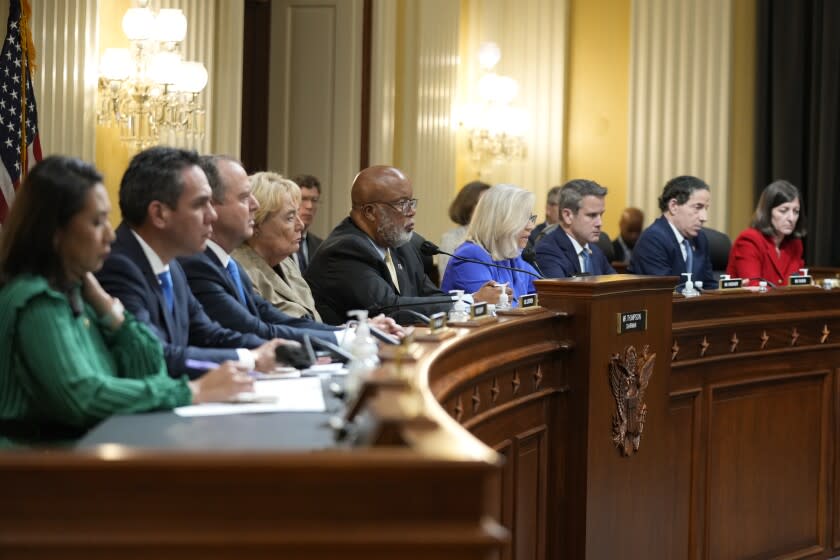Key moments from Jan. 6 House hearing

- Oops!Something went wrong.Please try again later.
- Oops!Something went wrong.Please try again later.
- Oops!Something went wrong.Please try again later.
The House Select Committee, tasked with investigating the root causes of the Jan. 6 insurrection, held its first public hearing Thursday night, after spending nearly one year conducting an investigation behind closed doors.
Rep. Bennie Thompson (D-Miss.), the committee chair, opened the hearing by saying the false assertions of former President Trump led to the insurrection, which was "the culmination of an attempted coup." He said the federal government "can’t sweep what happened under the rug."
Here were some key takeaways:
Barr told Trump that his voter fraud claims were 'bullshit'
A video deposition was shown of former Atty. Gen. William P. Barr saying that he told Trump he didn't agree with his assertion of voter fraud, and that after election day he thrice spoke with the former president. Barr said he “made it clear I did not agree with the idea of saying the election was stolen and putting out this stuff, which I told the president was bullshit." Barr said he "didn't want to be a part of it" and said the rhetoric was partly why he left the job.
“You can’t live in a world where the incumbent administration stays in power based on its view, unsupported by specific evidence … that there was fraud in the election," Barr said.
WATCH: Attorney General Barr declares that Donald Trump lost the Presidential election in 2020.
There is no doubt that the American people voted Trump out of office and the Select Committee has found no evidence of election fraud. pic.twitter.com/qa5qNyMXqS— January 6th Committee (@January6thCmte) June 10, 2022
Ivanka Trump didn't believe her father's false election fraud claims
The House committee showed video footage of the virtual deposition of former White House advisor Ivanka Trump saying she accepted Barr's assessment that the 2020 presidential election was not stolen from her father. Barr's assertion "affected my perspective," she said.
"I respect Attorney General Barr so I accepted what he said," she said.
McCarthy implored the Trump family to call off the mob
The committee's top Republican Rep. Liz Cheney (R-Wyo.) said that House Minority Leader Kevin McCarthy (R-Bakersfield) was "scared" and asked multiple Trump family members to quell insurrectionists "after he could not persuade the president himself." The admission is astonishing for McCarthy who has tried distancing himself from his past criticism of the former president's actions that day. The Californian has downplayed the insurrection and corralled Republicans against Cheney because of her involvement in the House select committee.
Capitol Police officer recalls the 'carnage'
Capitol Police Officer Caroline Edwards told the committee she was “slipping in people’s blood" as she battled insurrectionists during the siege.
“It was something like I'd seen out of movies," said Edwards, the first officer injured by rioters that day. "I couldn't believe my eyes. There were officers on the ground. You know, they were bleeding. They were throwing up. I mean I saw friends with blood all over their faces. I was slipping in people's blood. You know, I was catching people as they fell. It was carnage. It was chaos. I can't even — I can't even describe what I saw. I never in my wildest dreams did I think that as a police officer, as a law enforcement officer, I would find myself in the middle of a battle.”
Meadows tried to rewrite the narrative of Trump's response
Former White House Chief of Staff Mark Meadows wanted to "establish the narrative that the president is still in charge,” according to video testimony from Chairman of the Joint Chiefs of Staff Gen. Mark Milley, which was shared by Cheney.
Cheney noted that Trump was silent for much of that day; he did not call for federal law enforcement to quell the siege during critical hours. Milley said that Vice President Mike Pence responded much differently, using “explicit” and “very direct” language calling for the military and the National Guard to stop the riot. According to Milley, Meadows said the administration needed to “kill the narrative that the vice president is making all the decisions.”
Milley said Meadows' remarks were a "red flag" and he interpreted them as political.
Times writer Noah Bierman contributed reporting
This story originally appeared in Los Angeles Times.

